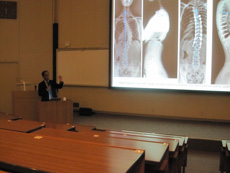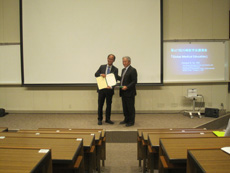Menu
- トップぺージ
- 講演会予定
- 過去の講演会
├令和6年
├令和5年
├令和4年
├令和3年
├令和2年
├平成31年
├平成30年
・第434回
・第433回
・第432回
・第431回
・第430回
・第429回
・第428回
・第427回
・第426回
・第425回
・第424回
・第423回
・第422回
・第421回
・第420回
・第419回
・第418回
・第417回
・第416回
・第415回
・第414回
・第413回
・第412回
・第411回
・第410回
・第409回
・第408回
・第407回
├平成29年
├平成28年
├平成27年
├平成26年
├平成25年
├平成24年
├平成23年
├平成22年
├平成21年
└平成20年
- オンデマンド講演会
過去の講演会
第427回川崎医学会講演会
| :: 日 時 | 平成30年10月3日(水) 17:30・18:30 |
| :: 場 所 | 校舎棟 M-702 |
| :: 座 長 | 長谷川 徹 |
「Global Medical Education」
Howard S. An, MD
The Morton International Chair and Professor, and Director of Spine Fellowship.
Department of Orthopaedic Surgery Rush University Medical Center. Chicago, IL USA
Traditional medical education includes training of medical students, residents, fellows, and allied medical health students in class rooms, clinics, and hospitals within its institution. There is a lack of information exchange outside the institution let alone abroad. There is minimal exposure to medical diseases outside the country. By international collaboration, we can learn each other the curriculum of core knowledge, online resources, teaching of psychomotor skills using simulators, research methodology, etc.
Globalization of medical education is important as there is an increased diversity of people in any nation, and more people travel internationally than ever before. Infectious diseases or epidemics spread globally, and knowledge of these diseases is important in prevention, spread, and cure. Globalization of medical education is also important to improve patient care by information exchange of knowledge and surgical skills. Teaching methods vary widely among institutions and adapting the most efficient and effective method will help educate the next generation of students. Also, the availability of drugs and devices is not the same globally, and some patients can benefit from getting the necessary medical care not available in their own country.
In addition to the exchange of medical information and surgical skills, medical ethics should be stressed for the teaching of students at any level. Medical ethics is universally understood in that we are in a profession to help patients, and no other socioeconomic factors should prioritize over the well-being of the patient. Global education should include the teaching of ethical conducts and responsibilities toward patients (“treat all patients like your family”), ethical behavior toward colleagues and staff, ethical principles behind research and publication, and avoiding or minimizing conflict of interest.

